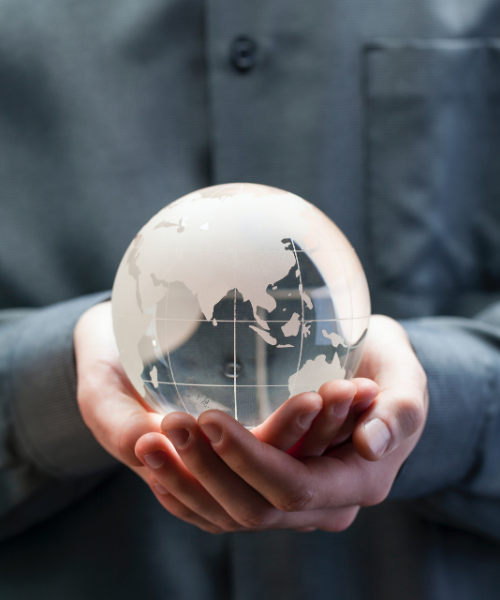Making Sense of World Politics
This series aims to combine several international relations theories with topical and current world events. Questions are raised about democracy, conflicts, climate change, foreign policy and more. The Covid-19 crisis has put pressure on many of us and clearly too on world politics. How have and will things change for better or for worse? The first lecture professor Muge Kinacioglu will join Birsen Erdogan. The last lecture Jay Huang will participate.
The individual lectures
1. Curse or Opportunity? COVID-19 and its Impact on the Global Politics (12 Jan)
Is Covid-19 crisis going to increase fragmentation and isolation in the world politics or will it bring a sense of solidarity and cooperation? In this lecture, two lecturers will discuss two International Relations approaches and their different analyses for the Covid-19 crisis: political realism and liberalism. Having some similarities, these two approaches also differ in many ways. The realist approach is often blamed for being state-centric and for encouraging states to be self-sufficient. The liberal approach on the other hand assumes that individuals and societies are inherently cooperative. This cooperation would foster more integration and unity among nations. In the lecture, both approaches and their assumptions will be discussed, while applying them to the current crisis.
2. Is the State Back? (19 Jan)
Those who have been following the discussions about the Covid-19 crisis must have realized that extremely capitalist, minimally interventionist state model has been attacked from different sides. Whereas social welfare state has been praised by many observers around the world. In some other circles, there is an argument being discussed: authoritarian states deal with the crisis similar to Covid-19 better than democratic states. These discussions bring two interesting questions to the mind: Is fierce capitalism going to be reformed? How do democracies and authoritarian states differ in responding and successfully resolving the crisis situations? While this lecture focusses on the idea, role and function of state; it will also discuss several state models, their strengths and weaknesses.
3. Post-COVID-19: the End of Ecological Colonialism? (2 Feb)
This lecture is about a couple of significant issues and developments taking place in the world and affecting everybody to a great degree. In this provocative lecture, lecturer will discuss post-colonial and environmental theories of International Relations especially in the ongoing Covid 19 era. By combining the assumptions of two theories (and getting some inspiration from the critical approaches such as Frankfurt School), she will analyse the post-Corona politics in the world, its economic-social-cultural-political structures and then link it to the future of our earth. This lecture will investigate how the Covid-19 crisis was affected and has been affecting the environment and climate change. The lecture will critically evaluate the role of modernity and industrialization. Certain practices and ‘habits’ we have developed in the rich countries such as extreme consumerism, increasing selfishness, luxurious life styles, and materialistic tendencies will be examined in the light of the social, economic, political, cultural and environmental problems in the world.
4. National (In)security (9 Feb)
This lecture will be about a controversial approach in International Relations: Post-structuralism. This approach is about language and hegemonic relations in our world. It also discusses how and why the discourse of ‘national security’ constructs an ‘enemy’ and ‘threat, which at the end might increase insecurity. This lecture will cover issues and practices such as (in)security, surveillance, control and limitations in liberties and freedoms in various forms. These issues will be analysed from a post-structural perspective especially inspired by Foucault, Derrida and Agamben. Relevant concepts such as PAN-OPTICON, Foucault`s concept of BIOPOWER and Agamben`s BARELIFE will be introduced and discussed. The lecture will discuss the pandemic politics and surveillance connecting them to the old and new forms of governance (and governing bodies). In this sense, this lecture will bring an alternative perspective to the politics and our society by looking at them from a very critical angle.
5. Approaches from Asia and Global South (23 Feb)
Even though the history of political thought and statecraft go back to centuries ago in Asia and in global South, many experts in West have not shown any interest in them until recently. In this lecture, lecturers will discuss this ‘gap’ in Western International Relations schools and approaches. Then several International Relations approaches born in Asia and Global South, which became ‘popular’ in the Western academia recently will be introduced. Without falling into the trap of making generalisations about regions and cultures and avoiding polarisations (binaries) between us and them or West and East, lecturers will try to explain how different understandings and perspectives about the world and politics can learn from each other. In this sense this lecture will shed a light on the views emerged in or emerging from non-Western parts of the world about politics, society, individual, economy, environment, state and security under the light of current changes and transformations in our world.

Dates
Tuesday 12 and 19 January 2, 9 and 23 February – 19:30 to 21:30
Costs whole series
UM students for free
UM employees and students from other schools €12,50
Others €25
Registration
You can register here for this lecture series.
About the speakers
Birsen Erdogan, LLM
Lecturer in International Law, UM
Prof. Muge Kinacioglu
Professor International Relations, Leiden University
Jay Huang, PhD
Assistant Professor of International Politics, Leiden University